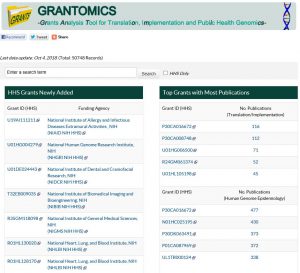Introducing GRANTOMICS: Our enhanced search engine and analysis tool for grant information associated with publications on genomics and population health impact.
Posted on by The CDC Office of Public Health Genomics has launched GRANTOMICS, an extension of the Public Health Genomics Knowledge Base (PHGKB). GRANTOMICS is an upgraded version of the Grant Database, introduced in March, 2018, and reviewed in a previous blog. The upgraded GRANTOMICS database allows you to:
The CDC Office of Public Health Genomics has launched GRANTOMICS, an extension of the Public Health Genomics Knowledge Base (PHGKB). GRANTOMICS is an upgraded version of the Grant Database, introduced in March, 2018, and reviewed in a previous blog. The upgraded GRANTOMICS database allows you to:
- Perform searches with any free text word or term, including environmental risk factors, diseases, genes, and any other terms of interest.
- Filter search results by ‘Funding Agency’ and ‘Country’.
- Perform a descriptive analysis on the grant-related publications from user search results (select ‘Publications Related’ button), which displays distribution of publications in Genomics & Health Impact Weekly Scan Database and/or the HuGE Literature Finder Database (select ‘Get all Records’ to link directly to records in respective database) and provides yearly publication trends within both of these databases and topic category-breakdown in the publications from Genomics & Health Impact Weekly Scan Database (select ‘Statistics’).
- Ascertain detailed information on individual grants through a direct link to the grant in NIH RePORT (Research Portfolio Online Reporting Tools), a website that provides access to a variety of reporting tools, reports, data, and analyses of NIH research activities.
- Restrict searches to funding specific agencies within the U.S. Department of Health and Human Services (HHS).
- Download information on grants returned by a search, including grant number, funding agency, country, and the PubMed IDs of associated publications.
- Quickly link to all publications for any one grant of interest within Genomics & Health Impact Weekly Scan Database and/or the HuGE Literature Finder Database, and hyperlink to PubMed from there.
The data in GRANTOMICS is updated regularly. As of September 21, 2018, the database contains 50,635 grant records, representing grants from nine countries and 944 funding agencies, all of which are associated with the published literature from within Genomics & Health Impact Weekly Scan Database and the HuGE Literature Finder Database.
The information made available through GRANTOMICS enables potential grant applicants or funding agencies to identify gaps in knowledge for genomic translational research, and enables researchers to identify potential collaborators. Using “breast cancer” as a free text search example, we illustrate resulting summary data, (Figure 1) and graphs by year and topic area. (Figure 2 and Figure 3).
We are eager to get input and feedback on how to continue to improve GRANTOMICS and PHGKB in general. Our contact email: genetics@cdc.gov
Figure 1. Statistics on “Breast Cancer” as a search term
Total number of Grants: 3121
Total number of funding agencies: 119
Total number of associated publications in Genomics & Health Weekly Scan Database: 391
- Translation/Implementation Studies: 310
- Evidence Synthesis: 20
- Guidelines: 9
- Tools/Methods: 9
- Reviews/Commentaries: 35
- Other: 4
Total number of associated publications in HuGE Literature Finder Database: 1483
Figure 2: Distribution of associated publication trends by year and by publication types in Genomics & Health Weekly Scan Database for “Breast Cancer”
Figure 3: Distribution of Publication By Year in HuGE Literature Finder database for “Breast Cancer”
Disclaimer: Information in GRANTOMICS is derived from the publically available PubMed database. This information is provided solely as a service to the public and the research community. Inclusion in the database does not imply new funding or endorsement of the Centers for Disease Control and Preventions or DHHS. References to publications associated with grants are provided solely for informational purposes and do not imply endorsement by CDC or DHHS.
Posted on by




